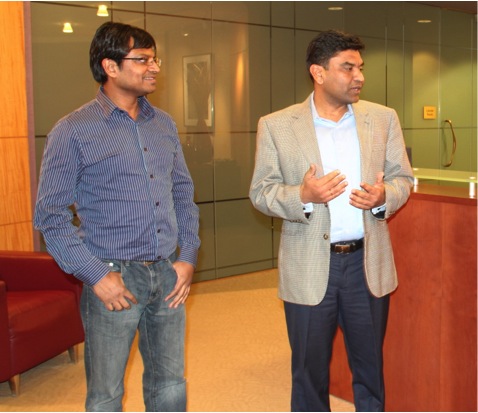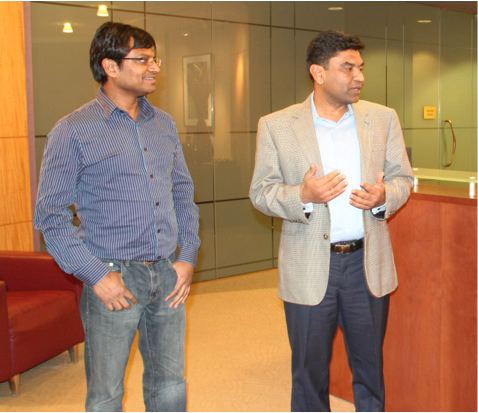Revolutionizing the way people send money to loved ones around the world
Sponsor content from HP

A free daily email with the biggest news stories of the day – and the best features from TheWeek.com
You are now subscribed
Your newsletter sign-up was successful

When immigrants come to America, many of them are looking for ways to send some of the money they earn back home. But often the fees for the transaction are exorbitant and the person sending the cash has no control over who gets the money or what it’s used for.
That’s why Anurag Jain and Ajay Goyal decided to launch Prepay Nation, a service that allows customers to purchase airtime for their friends and family directly from telecom companies. Though the business is mostly focused on mobile phone transactions, it also allows for money transfers to mobile wallet accounts.
“A customer says, ‘Here’s my $10. I want to buy airtime for my mom’s cell phone.’ What we do is connect this customer to his or her mom’s cell phone company and facilitate the payment,” explained Jain, Prepay Nation’s co-founder and chief executive officer.
The Week
Escape your echo chamber. Get the facts behind the news, plus analysis from multiple perspectives.

Sign up for The Week's Free Newsletters
From our morning news briefing to a weekly Good News Newsletter, get the best of The Week delivered directly to your inbox.
From our morning news briefing to a weekly Good News Newsletter, get the best of The Week delivered directly to your inbox.
Prepay Nation basically solves two problems that have plagued people sending remittances to their countries of origin. First, it enables immigrants to transfer small amounts of money without any cost to the sender or the receiver. Second, it allows the sender to designate where and how the money is spent.
Goyal, who co-founded the company and serves as chief technology officer, and Jain easily found a market. In the past five years, Prepay Nation has become one of the fastest growing businesses in the United States. Jain estimates that Prepay Nation has processed $250 million through roughly 20 million transactions. The company now operates in more than 100 countries, has partnered with more than 200 mobile operators and boasts a footprint of 175,000 retail locations.
“We had no idea that it would grow this much,” Jain said, noting that Prepay Nation collects a small commission from the telecom operators for the service. “That kind of growth was no where in the business plan. We were pleasantly surprised
Their beginnings were humble. At first, it was just Jain and Goyal along with a third partner who left the business to pursue other opportunities. They put in 90-hour weeks and were lucky enough to have a few people volunteer their time to help get the company off the ground.
A free daily email with the biggest news stories of the day – and the best features from TheWeek.com
While most of their business originates from within the United States, Jain and Goyal are looking for ways to expand into other markets like Canada and Europe. In the future, Prepay Nation also plans to launch more products. Right now, the company is offering gas vouchers in Haiti and is in talks with utility companies and grocery chains in Jamaica to explore opportunities there.
“Success is in the eye of the beholder,” Goyal said. “But the way I define success for us is whether or not we can revolutionize the industry in a way that helps the people who are trying to help their loved ones.”
-
 Crisis in Cuba: a ‘golden opportunity’ for Washington?
Crisis in Cuba: a ‘golden opportunity’ for Washington?Talking Point The Trump administration is applying the pressure, and with Latin America swinging to the right, Havana is becoming more ‘politically isolated’
-
 5 thoroughly redacted cartoons about Pam Bondi protecting predators
5 thoroughly redacted cartoons about Pam Bondi protecting predatorsCartoons Artists take on the real victim, types of protection, and more
-
 Palestine Action and the trouble with defining terrorism
Palestine Action and the trouble with defining terrorismIn the Spotlight The issues with proscribing the group ‘became apparent as soon as the police began putting it into practice’
-
 Epstein files topple law CEO, roil UK government
Epstein files topple law CEO, roil UK governmentSpeed Read Peter Mandelson, Britain’s former ambassador to the US, is caught up in the scandal
-
 Iran and US prepare to meet after skirmishes
Iran and US prepare to meet after skirmishesSpeed Read The incident comes amid heightened tensions in the Middle East
-
 Israel retrieves final hostage’s body from Gaza
Israel retrieves final hostage’s body from GazaSpeed Read The 24-year-old police officer was killed during the initial Hamas attack
-
 China’s Xi targets top general in growing purge
China’s Xi targets top general in growing purgeSpeed Read Zhang Youxia is being investigated over ‘grave violations’ of the law
-
 Panama and Canada are negotiating over a crucial copper mine
Panama and Canada are negotiating over a crucial copper mineIn the Spotlight Panama is set to make a final decision on the mine this summer
-
 Why Greenland’s natural resources are nearly impossible to mine
Why Greenland’s natural resources are nearly impossible to mineThe Explainer The country’s natural landscape makes the task extremely difficult
-
 Iran cuts internet as protests escalate
Iran cuts internet as protests escalateSpeed Reada Government buildings across the country have been set on fire
-
 US nabs ‘shadow’ tanker claimed by Russia
US nabs ‘shadow’ tanker claimed by RussiaSpeed Read The ship was one of two vessels seized by the US military